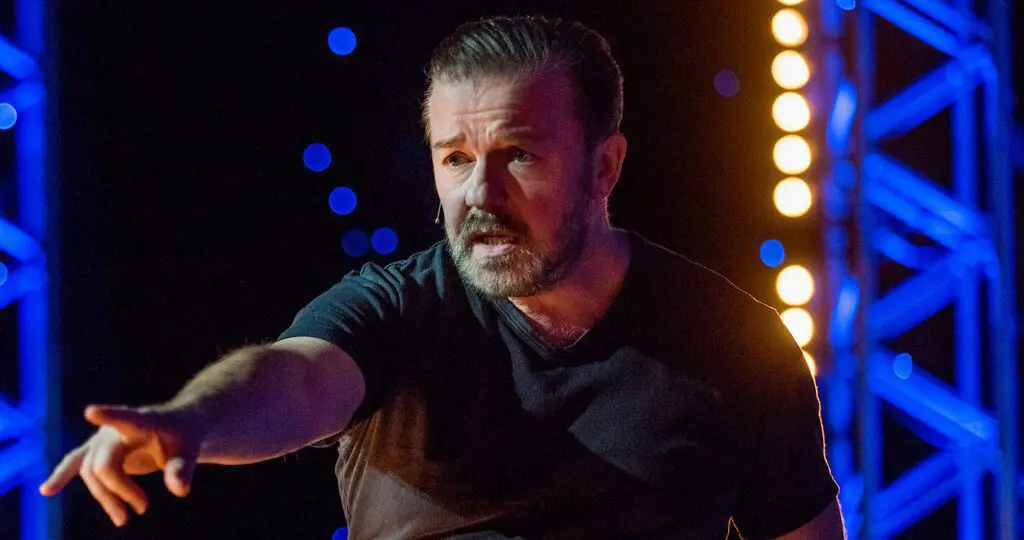Summary
Ricky Gervais knows exactly which buttons to press, but his overreliance on old material and played-out angles makes his latest special uncharacteristically tedious.j
Ricky Gervais loves irony. He uses it as an excuse for almost everything he says, and in his latest Netflix special, Ricky Gervais: SuperNature, it’s one of the first things he brings up. “That was irony,” he says after making an old-hat joke about the lack of funny female comedians, “there’s going to be a bit of that throughout the show. See if you can spot it.” But the real irony of this hour-long special is that he’s much funnier when he’s not actually trying to be ironic.
This is partly down to the fact Gervais mostly interprets irony as an implicit understanding that the audience knows he doesn’t mean the terrible things he says. And I agree that he doesn’t. There wouldn’t be any comedians if that’s how comedy worked. It used to be that everyone thought a joke was funny until it was about them. These days everyone thinks a joke is funny until it’s about any of an increasing list of topics that have been deemed completely off-limits. It must be frustrating for a comic.
Gervais deals with that frustration by making the jokes he would anyway but pointing out why they’re jokes. His reminders that he doesn’t really mean anything he says feel self-defensive after a while, which is as much a criticism of contemporary culture as it is of him, but you’d think he’d have a better way of adapting. Despite his divisive persona, I’ve always believed there was a streak of comedic genius to Gervais, especially in his writing. Given a lot of his output over the last few years, I’m starting to think that perhaps that genius streak was named Stephen Merchant.
But anyway. Why SuperNature? According to Gervais’s own explanation, it’s because the show is about debunking the supernatural and reiterating that nature is super enough without the need for an omniscient all-powerful designer. Like in Animals, Politics, and Fame, which were all named after broad topics that most of Gervais’s material largely ignored, SuperNature is only rarely about nature or the supernatural. When it is, it’s very funny. The best bit pokes fun at a Californian society of reincarnation proponents whose “come as you were” party featured two Napoleons. But the catch-all topic is mostly an excuse for riffs on progressivism and identity politics; how jokes work and who they’re for. Gervais is one of a few comedians who haven’t realized that this is the comedy equivalent of the Chinese finger trap, which only gets tighter the more you try to do the obvious thing and pull away from it.
I get the impulse – progressive identity politics are easy to make fun of, they always get a laugh from a certain crowd, and they come with the added benefit of guaranteed backlash, which is good marketing. But they require that comedy become too self-referential and self-explanatory. It isn’t enough, anymore, to make an offensive joke; you also must explain how it isn’t offensive when you think about it in the right way, which is like a magician explaining how a trick works. As soon as you show the strings, the magic goes away.
It should be self-evident that most comedians know what’s funny about stereotypes and know the difference between satirizing attitudes and indulging in actual hate speech. But we live in a climate where that isn’t self-evident, which is why I see 18-year-olds on Twitter claiming, for instance, that renowned comedian Dave Chappelle was never funny in the first place. And I get that impulse too, since it’s easier to believe that than to believe a very smart and often brilliant man thinks you taking offense at jokes is ridiculous. It’s easier to think that he believes it, rather than having to reckon with why it’s funny to pretend not to.
In the wake of the killing of George Floyd, Chappelle sat on stage in the midst of a pandemic and spoke for half an hour about that tragedy. He wasn’t really trying to be funny, though he was in spots, and he wasn’t trying to make a case for himself, though he did anyway, since only someone very thoughtful and very skilled as an orator could have said what he said as powerfully as he did. It’s hard to dismiss someone like that.
Ricky Gervais hasn’t had an 8:46 moment. Gervis, it turns out, either isn’t capable of or interested in finding a novel angle for making the things he actually believes funny, so instead he peddles things he doesn’t believe and inoculates himself against criticism by repeatedly pointing out that he doesn’t believe them. There’s a whole extended bit towards the end which he laughingly describes as childish and misinformed, and he states outright that the punchline isn’t worth it. Why bother, then? Because at the end of the day, he’s right. The punchline wasn’t worth it at all.
None of this is offensive – that’s not my problem. It’s just too easy for a man of Gervais’s once-obvious talents. At a couple of points, he recycles old bits from previous specials, such as one about winching the morbidly obese from their homes, and another about acting more working-class around builders. His loftier insights have been peddled on countless talk shows and podcast appearances. Nothing he’s saying is new. Even the – again, ironic – jokes about his success, including the admittedly funny claim that him being a white heterosexual multi-millionaire technically makes him a minority, were covered more comprehensively in his previous Netflix special, Humanity.
But here we are. Gervais is wildly successful, mostly and deservedly for his TV writing, so there’s little chance that SuperNature won’t do insane numbers and provoke a flurry of debate on social media. He’ll retweet compliments, especially incendiary ones about the touchiness of the woke brigade, and I’m sure someone, somewhere, will earnestly try to cancel him. There will be think-pieces in politically slanted publications about the real harm that Gervais’s words have caused for any number of marginalized groups he has made fun of, and those envelopes full of cash he mentioned will continue to drop through his letterbox. The world will keep turning, and nothing will really change – least of all Gervais’s material.




